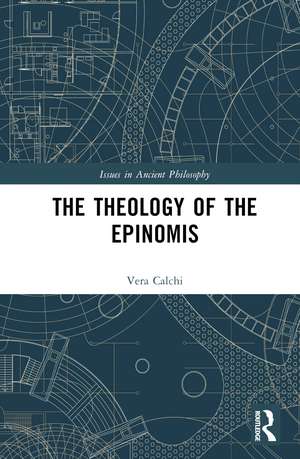The Theology of the Epinomis: Issues in Ancient Philosophy
Autor Vera Calchien Limba Engleză Hardback – 16 dec 2022
The Epinomis is the ‘appendix’ to Plato’s Laws likely written by Plato’s student and disciple, Philip of Opus, who is believed to have taken care of the arrangement and posthumous editing of the Laws into twelve books. Through a comprehensive analysis of the Epinomis’ lexicon, and comparisons with the Corpus Platonicum, Vera Calchi offers readers an insight into the Epinomis’ philosophical and historical context, purpose, and legacy. Calchi argues that Philip effectively reshapes Plato’s metaphysical language into a theology premised on the immanence of God in the heavens. The resulting account of God’s providential activity in the cosmos, which offers a new way of thinking about morality and political order, can be regarded as a major step towards the cosmic theology of the Hellenistic period.
The Theology of the Epinomis is suitable for students and scholars of ancient philosophy, particularly those working on the Epinomis and Platonic philosophy. It will also be of interest to those studying the history of religion and theology in antiquity.
| Toate formatele și edițiile | Preț | Express |
|---|---|---|
| Paperback (1) | 259.10 lei 43-57 zile | |
| Taylor & Francis – 28 oct 2024 | 259.10 lei 43-57 zile | |
| Hardback (1) | 899.26 lei 43-57 zile | |
| Taylor & Francis – 16 dec 2022 | 899.26 lei 43-57 zile |
Din seria Issues in Ancient Philosophy
-
 Preț: 310.85 lei
Preț: 310.85 lei -
 Preț: 313.38 lei
Preț: 313.38 lei -
 Preț: 485.24 lei
Preț: 485.24 lei - 17%
 Preț: 272.50 lei
Preț: 272.50 lei -
 Preț: 382.95 lei
Preț: 382.95 lei -
 Preț: 389.38 lei
Preț: 389.38 lei -
 Preț: 362.05 lei
Preț: 362.05 lei -
 Preț: 389.38 lei
Preț: 389.38 lei -
 Preț: 390.63 lei
Preț: 390.63 lei -
 Preț: 395.25 lei
Preț: 395.25 lei - 18%
 Preț: 1000.27 lei
Preț: 1000.27 lei -
 Preț: 400.98 lei
Preț: 400.98 lei -
 Preț: 362.05 lei
Preț: 362.05 lei -
 Preț: 363.00 lei
Preț: 363.00 lei - 17%
 Preț: 259.31 lei
Preț: 259.31 lei - 15%
 Preț: 259.10 lei
Preț: 259.10 lei - 17%
 Preț: 257.08 lei
Preț: 257.08 lei
Preț: 899.26 lei
Preț vechi: 1096.66 lei
-18% Nou
Puncte Express: 1349
Preț estimativ în valută:
172.13€ • 187.03$ • 144.68£
172.13€ • 187.03$ • 144.68£
Carte tipărită la comandă
Livrare economică 21 aprilie-05 mai
Preluare comenzi: 021 569.72.76
Specificații
ISBN-13: 9780367683214
ISBN-10: 0367683210
Pagini: 224
Ilustrații: 4 Tables, black and white
Dimensiuni: 156 x 234 x 14 mm
Greutate: 0.68 kg
Ediția:1
Editura: Taylor & Francis
Colecția Routledge
Seria Issues in Ancient Philosophy
Locul publicării:Oxford, United Kingdom
ISBN-10: 0367683210
Pagini: 224
Ilustrații: 4 Tables, black and white
Dimensiuni: 156 x 234 x 14 mm
Greutate: 0.68 kg
Ediția:1
Editura: Taylor & Francis
Colecția Routledge
Seria Issues in Ancient Philosophy
Locul publicării:Oxford, United Kingdom
Public țintă
Postgraduate and Undergraduate AdvancedCuprins
1. Introduction: the Epinomis, a mirror of its times: the transition from Plato to the Hellenistic age; Section One: The Epinomis and its background: re-shaping Plato's theological language; 2. The Phaedo and the Epinomis: the de-transcendentalised forms; 3. The Timaeus and the Epinomis: God's non-imitative activity; 4. The Cratylus and the Epinomis: Homoiosis theo(i) and astral worship; 5. The Laws and the Epinomis: the astral psychic immanent God; Section Two: The Epinomis and its advance: the Olympians' departure; 6. The greatest God; 7. Philip of Opus' contributions to the Early Academy: the theology of the Epinomis; 8. The Epinomis, a vivid example of transition.
Notă biografică
Vera Calchi is currently a postdoctoral researcher at Politecnico di Milano, Italy. She earned her PhD in ancient philosophy in 2019 and was a visiting DS at various (non-) European universities. She is the author of Under the Auspices of Plato: Did Aristotle Read the Epinomis?
Recenzii
"The book provides the reader with a very vivid and fascinating account of the religious and social dynamics of the V-IV century BC and the originality of a philosophical project that acts as a bridge from the classical to the Hellenistic age." - Bryn Mawr Classical Review
"A beneficio di studiosi tanto del pensiero di Platone e della tradizione platonica quanto delle filosofie dell’età ellenistica". - Elenchos
[As useful for students of Plato’s thought and the Platonic tradition as it is for students of Hellenistic philosophy.]
"A beneficio di studiosi tanto del pensiero di Platone e della tradizione platonica quanto delle filosofie dell’età ellenistica". - Elenchos
[As useful for students of Plato’s thought and the Platonic tradition as it is for students of Hellenistic philosophy.]
Descriere
This first monograph devoted to the theology of the Epinomis offers readers an insight into the its philosophical and historical context, purpose, and legacy to reach a definition of its theology. Suitable for those studying ancient philosophy, particularly the Epinomis and Platonic philosophy.
